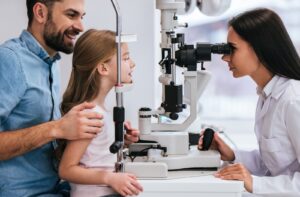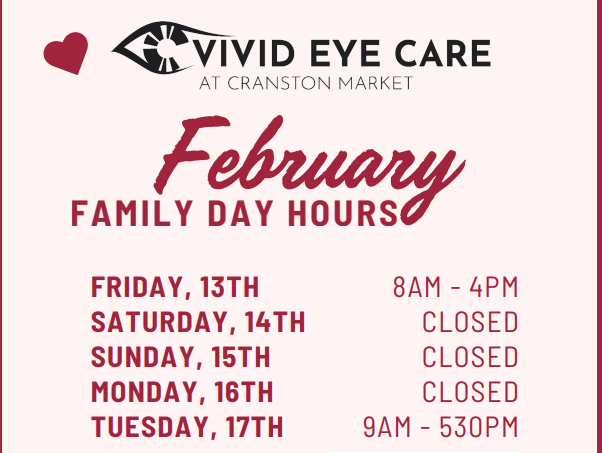
Myopia is one of the most common eye conditions in the world. With so many people experiencing blurry vision, there are several treatment options for this condition, such as glasses, contact lenses, and laser eye surgery. With so many treatments, is there a way to permanently cure myopia?
Continue reading to learn more about myopia, including if this condition is permanently curable.
What is Myopia?
Myopia, or nearsightedness, is a refractive error affecting vision where nearby objects appear clearly while far away objects are blurry. Nearly 30% of all Canadians have myopia, and it’s estimated almost 50% of the world will have this condition by 2050.
Myopia tends to develop in childhood, and it may progress until someone reaches adulthood. Undiagnosed myopia has several symptoms that may develop.
Symptoms of Myopia
Common myopia symptoms include:
- Blurry vision
- Excessive squinting
- Headaches
- Strained eyes
Because myopia often develops in childhood, there are several symptoms to be aware of for children. Most kids don’t know when their vision is affected, so keep an eye out for signs of vision problems.
A child with myopia may:
- Consistently squint
- Sit closer to the television or front of the classroom
- Excessively blink
- Frequently rub their eyes
Understanding myopia symptoms can help decide if you or someone you know requires an eye exam. With myopia being so prevalent, what causes this condition?
What Causes Myopia?
People with myopia have differently shaped eyes. Your eyeball may be too long, or the cornea has a steep curvature. This abnormal eye shape causes light to focus improperly, with light landing in front of the retina instead of on the retina.
There are other factors relating to myopia development, including:
- Reduced time spent outdoors
- Increased time in front of screens
- Family history
Myopia Progression in Children
Myopia typically develops in childhood, progressing until it stabilizes in early adulthood. Because myopia progresses as children age, it can cause a mild case of myopia to become more severe, known as high myopia.
Myopia is considered “high” when someone’s vision is above -6.00 diopters. High myopia increases the risk of developing several eye conditions, such as:
For children, specialized treatments can slow myopia progression, protecting their vision. For adults, there are several treatment options to help manage this condition. With today’s available treatments, can myopia be permanently cured?
Can Myopia Be Permanently Cured?
Myopia is typically a permanent condition, with treatment helping to manage and correct your vision. Some experts believe that myopia is curable through surgeries such as LASIK. This surgery has a higher than 90% success rate, but there’s never a guarantee.
If you have any questions related to treating myopia, speak with your optometrist. They can answer your questions and recommend the best treatment for your needs.
Myopia Treatments
There are many ways to treat myopia, including slowing this condition’s progression in children or providing clearer vision in adulthood. If you have myopia, treatments include corrective lenses, laser eye surgery, or myopia control.
Corrective Lenses
Corrective lenses include glasses and contact lenses. These lenses help your eyes focus light correctly, providing you with clear vision.
Glasses are a well-known and safe way to sharpen your vision. Besides a personalized look, different lenses are available based on your needs, including single-vision, bifocal, trifocal, and progressive lenses.
Contact lenses are a great alternative to glasses, resting directly on your eyes. You have a variety of choices when it comes to contacts. Your optometrist can help you choose the best lenses for your needs based on material, function, and other factors.
Types of contact lenses include:
- Rigid gas permeable lenses
- Scleral lenses
- Soft contact lenses
- Hybrid lenses
Laser Eye Surgery
Laser eye surgery can provide you with clearer vision by reshaping your cornea. This treatment isn’t only for myopia. It can successfully treat hyperopia (farsightedness) and astigmatism.
There are 3 common types of surgery:
Each of these surgeries has different benefits, and your optometrist can recommend the best treatment after completing a comprehensive eye exam. They can explain these surgeries in-depth, including the associated risks.
Myopia Control
Myopia control treatments focus on slowing down this condition’s progression in children. It’s important to remember that single-vision glasses only correct myopia. Specialized treatments can effectively slow myopic progression.
Myopia treatment starting at a young age can help prevent high myopia and avoid reliance on heavy prescriptions in adulthood.
Some common treatments include:
- Multifocal eyeglasses
- Atropine eye drops
- Soft multifocal contact lenses
If you have myopia, several treatments can help you manage this condition. Whether you’re interested in glasses, contact lenses, or surgical options, your optometrist can help you achieve clearer vision.
Manage Myopia Today
No matter your age, myopia can be irritating without proper management. Working with your eye doctor can help you find the best treatment options for your unique needs.
If you’re experiencing symptoms of myopia, book an appointment with your optometrist.






















